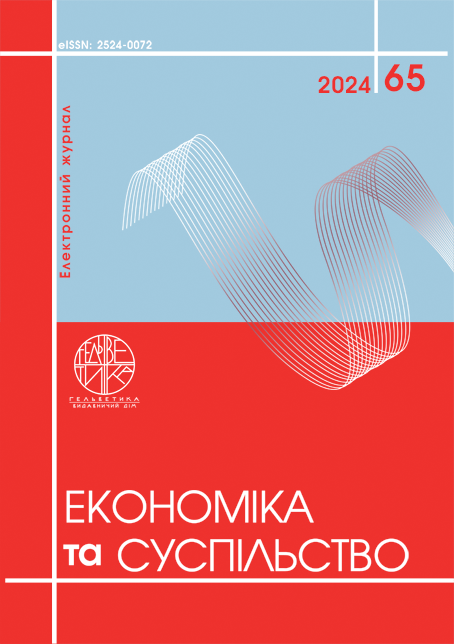IMPACT OF MILITARY CONFLICTS ON STOCK TRADING IN INTERNATIONAL STOCK MARKETS
Abstract
The article explores the profound fluctuations on stock exchanges caused by major global military conflicts, a subject that economists have scrutinized for nearly a century. However, consensus remains elusive regarding how wars influence stock exchanges, particularly stock trading, and whether there are recurring patterns and trends during significant international armed conflicts. The aim of this research is to investigate the reactions of the world's largest stock exchanges to the events of the First and Second World Wars and based on an analysis of data regarding the functioning of the most significant global stock exchanges, to assess the impact of contemporary major military conflicts such as the Russian invasion of Ukraine (February 24, 2022) and Hamas's attack on Israel (October 7, 2023) on stock exchanges in different regions of the world. Examining the historical impact of global military conflicts on stock markets, we found that not all wars affected them equally. This depended on various factors such as the nature of the conflict, the strength of the economy before the war, the level of economic integration into the global economy, whether a country was a direct or indirect participant in the conflict, etc. The beginning of each military conflict remains a significant stressor for the international market, leading to periods of uncertainty and volatility. Thus, through dynamic analysis, we attempted to analyze key performance indicators of the world's largest stock exchanges located in different regions of the planet during periods when stock markets operated under the influence of significant events such as Brexit, escalating tensions between the US and China, the COVID-19 pandemic, and the full-scale Russian invasion of Ukraine and Hamas attack on Israel. The events of February 2022 unequivocally affected the performance indicators of the world's largest stock exchanges much more than, for example, COVID-19. All analyzed exchanges reported for the first time in the last 7 years a decrease in market capitalization, a significant reduction in IPOs, a decrease in net profit, and basic earnings per share. At the same time, the stock indices of the world's largest exchanges reacted much more sharply to the events of the global lockdown at the beginning of 2020 than to the start of the full-scale invasion in Ukraine. However, after the collapse in 2020, all exchanges quickly recovered their trend of dynamic index growth, whereas after the start of the major military actions in Ukraine, prices on the exchanges did not rise as actively, and even during the next 7-8 months fell even below the level of February 2022. Thus, the tendency for rapid recovery of stock markets with the onset of war, which we observed during the First and Second World Wars, did not confirm in the situation with the war in Ukraine.
References
Brune, Amelie, Hens, Thorsten, Oliver, Rieger Marc and Wang, Mei (2011), “The War Puzzle: Contradictory Effects of International Conflicts on Stock Markets”, Swiss Finance Institute Research, Paper No. 11-21, Available at: https://papers.ssrn.com/sol3/papers.cfm?abstract_id=1855895 (access date February 10, 2024).
Нudson, Robert & Urquhart, Andrew, (2015). "War and stock markets: The effect of World War Two on the British stock market," International Review of Financial Analysis, Elsevier, vol. 40(C), pages 166-177.
Schneider, Gerald & Troeger, Vera (2006). War and the World Economy. First publ. in: Journal of Conflict Resolution, Vol. 50 (2006), pp. 623-645. 50. 10.1177/0022002706290430.
Taylor, Bryan. World War 1 and Global Stock Markets, Global Financial Data, November 19, 2018. Available at: https://globalfinancialdata.com/world-war-1-and-global-stock-markets (access date February 10, 2024).
Taylor, Bryan. The Nazis and the Stock Markets, Global Financial Data, October 25, 2023. Available at: https://globalfinancialdata.com/the-nazis-and-the-stock-markets (access date February 12, 2024).
Annual reports of Nasdaq. Official website: Available at: https://ir.nasdaq.com/node/107121/html
Annual reports of LSEG. Official website: Available at: https://www.lseg.com/en/investor-relations/annual-reports
New issues and IPOs. LSEG: report. Available at: https://www.londonstockexchange.com/reports?tab=new-issues-and-ipos
Nasdaq Composite index. Barchart: web site. Available at: https://www.barchart.com/stocks/quotes/$NASX/interactive-chart
FTSE 100. London stock exchange: web site. Available at: https://www.londonstockexchange.com/indices/ftse-100
FTSE 250. London stock exchange: web site. Available at: https://www.londonstockexchange.com/indices/ftse-250
Hang Seng Index. Barchart: web site. Available at: https://www.barchart.com/stocks/quotes/$HSI/interactive-chart
TA-125 Index. TraidingView: web site. Available at: https://www.tradingview.com/symbols/TASE-TA125/

This work is licensed under a Creative Commons Attribution 4.0 International License.


